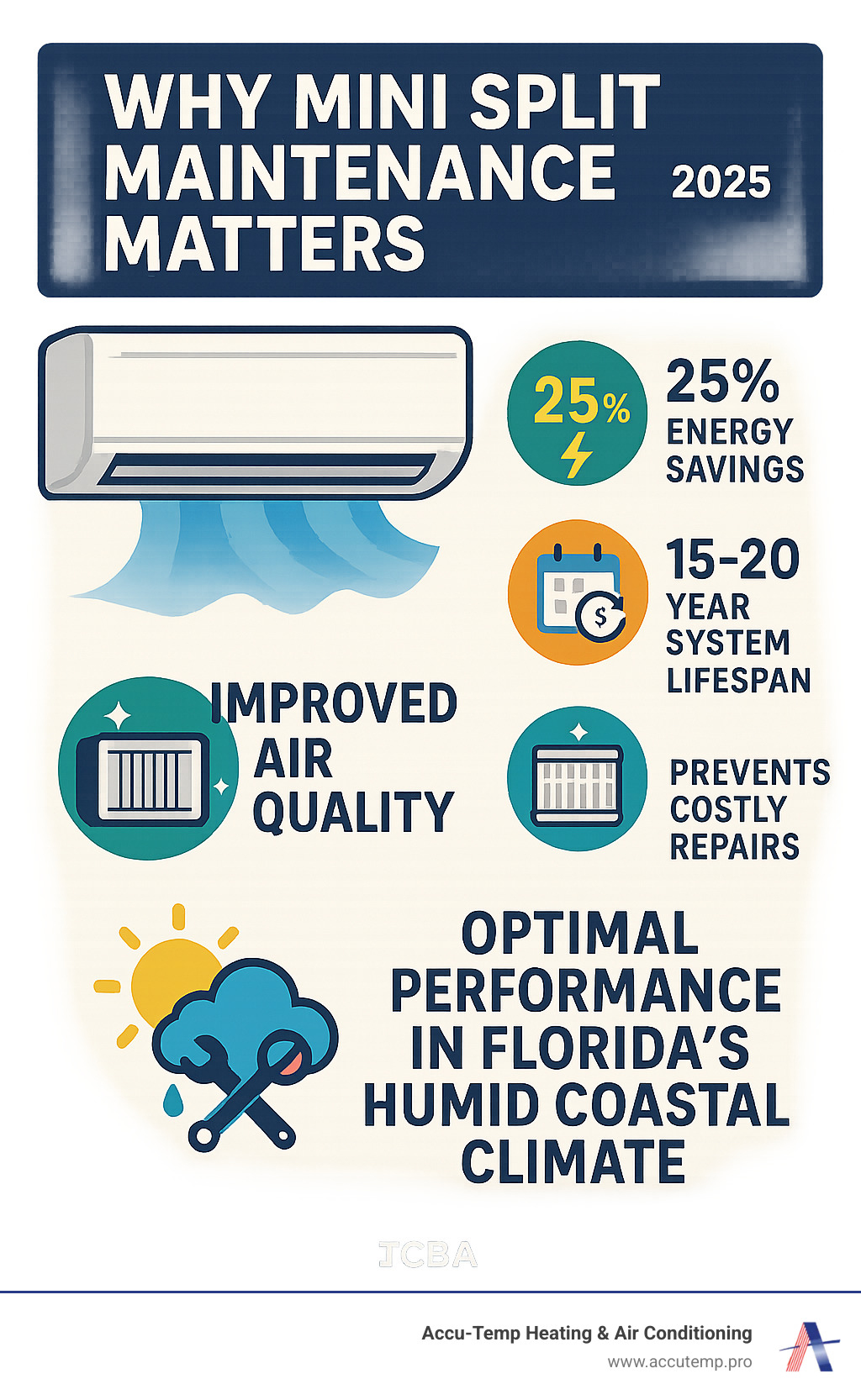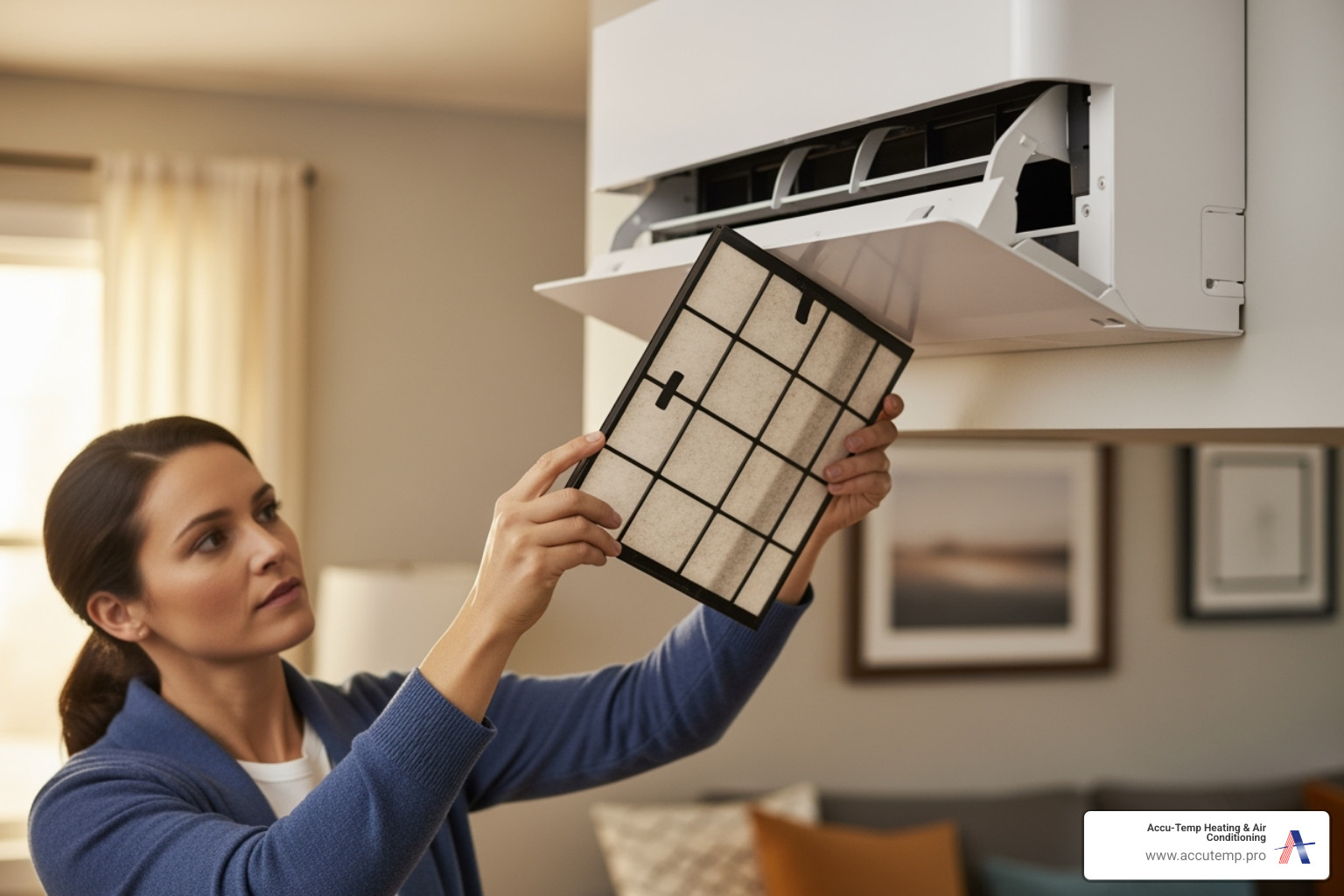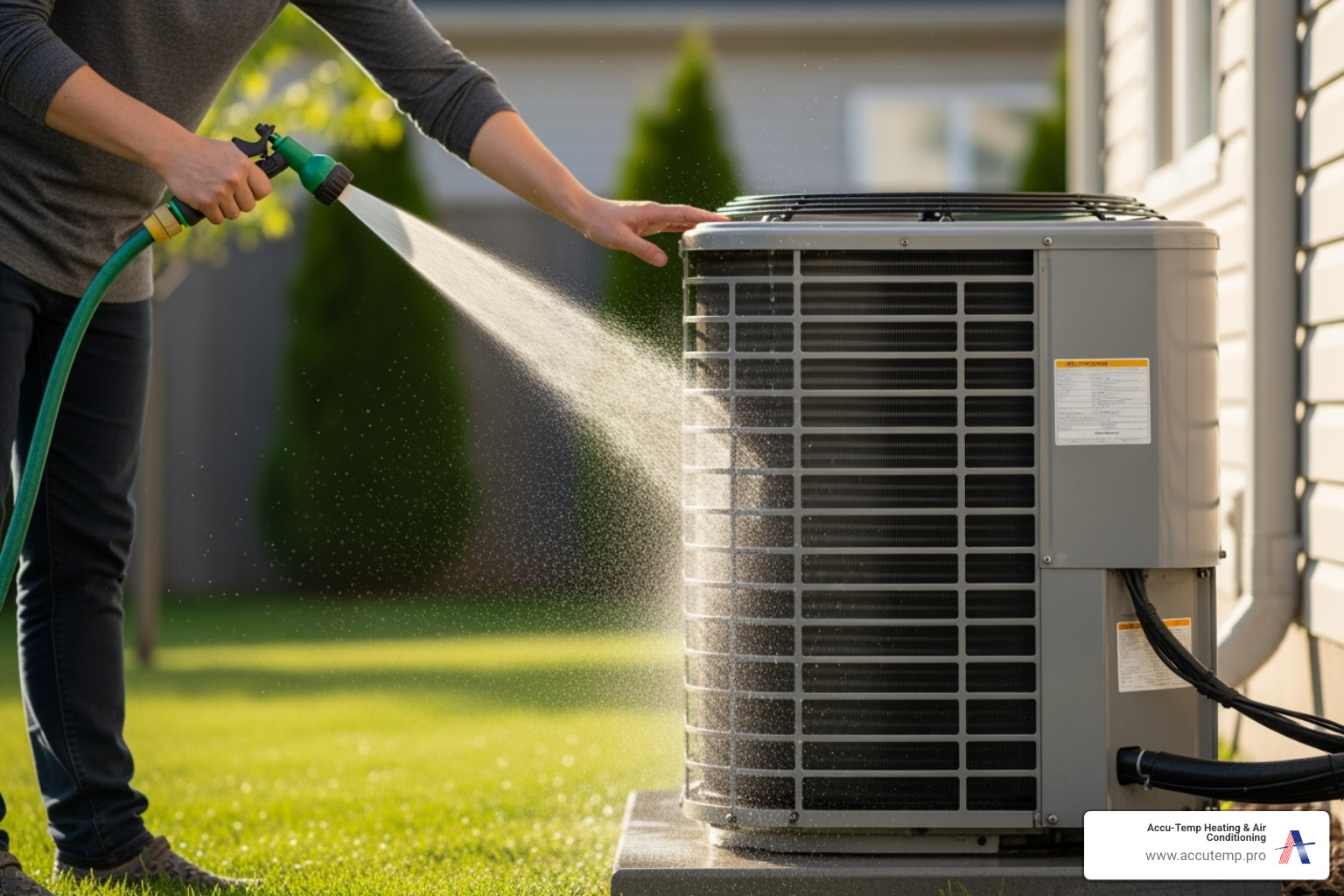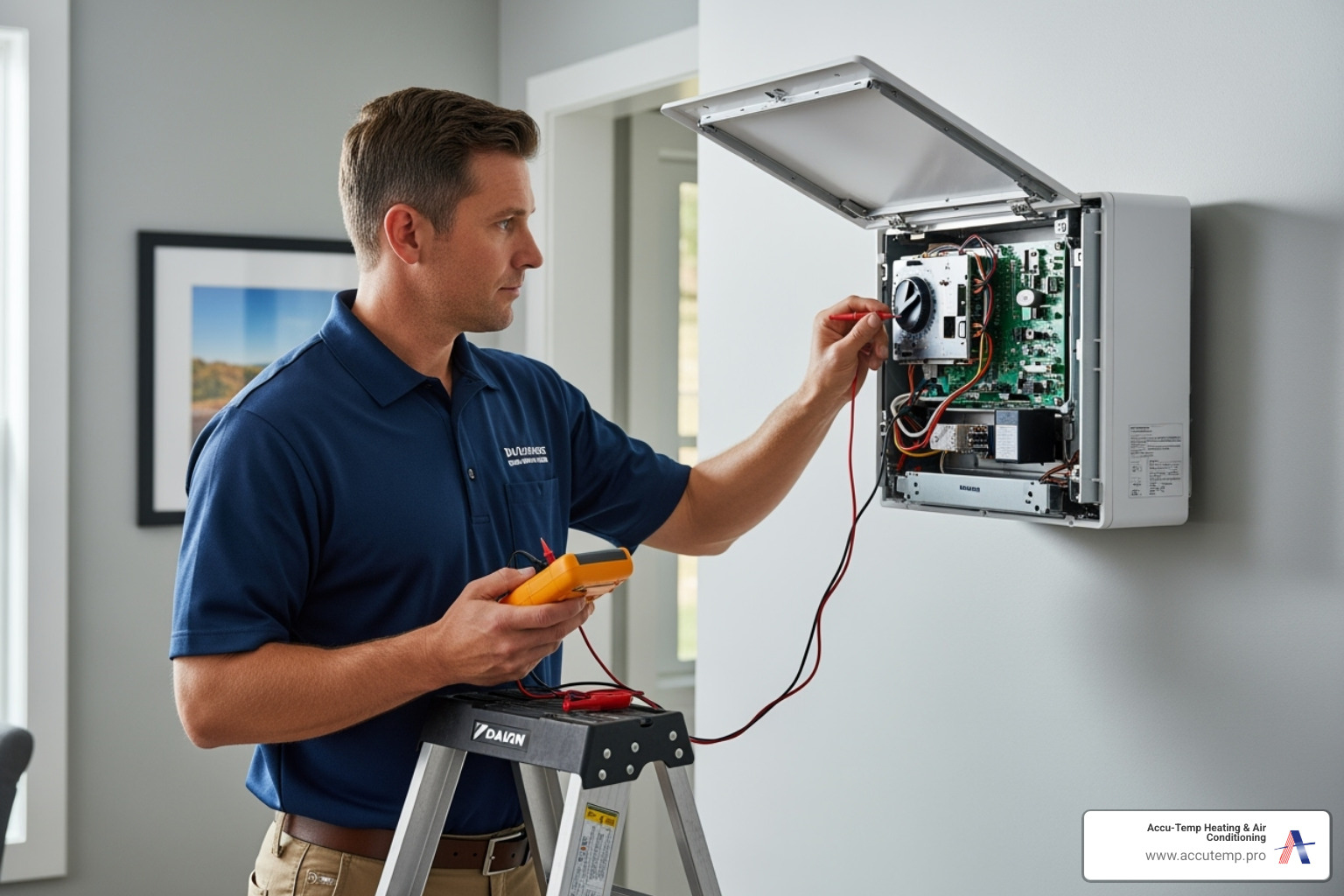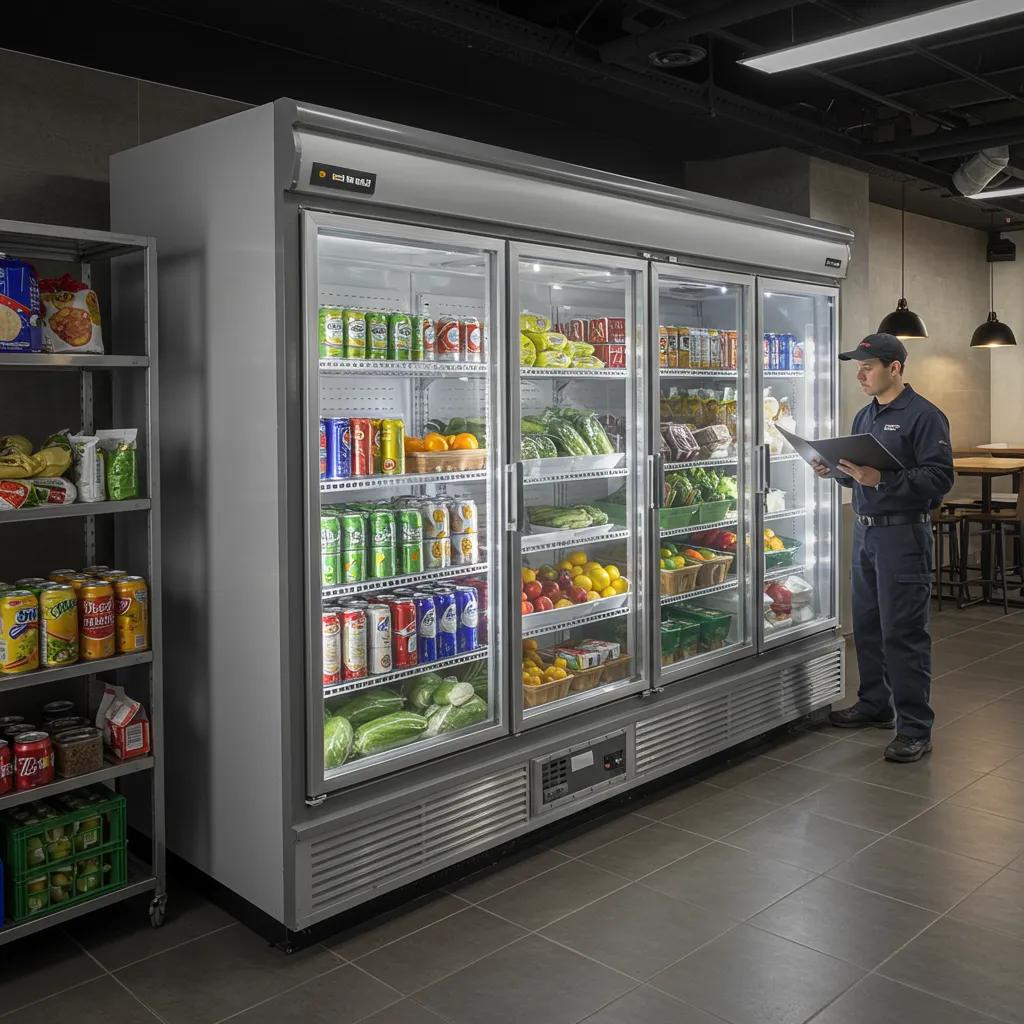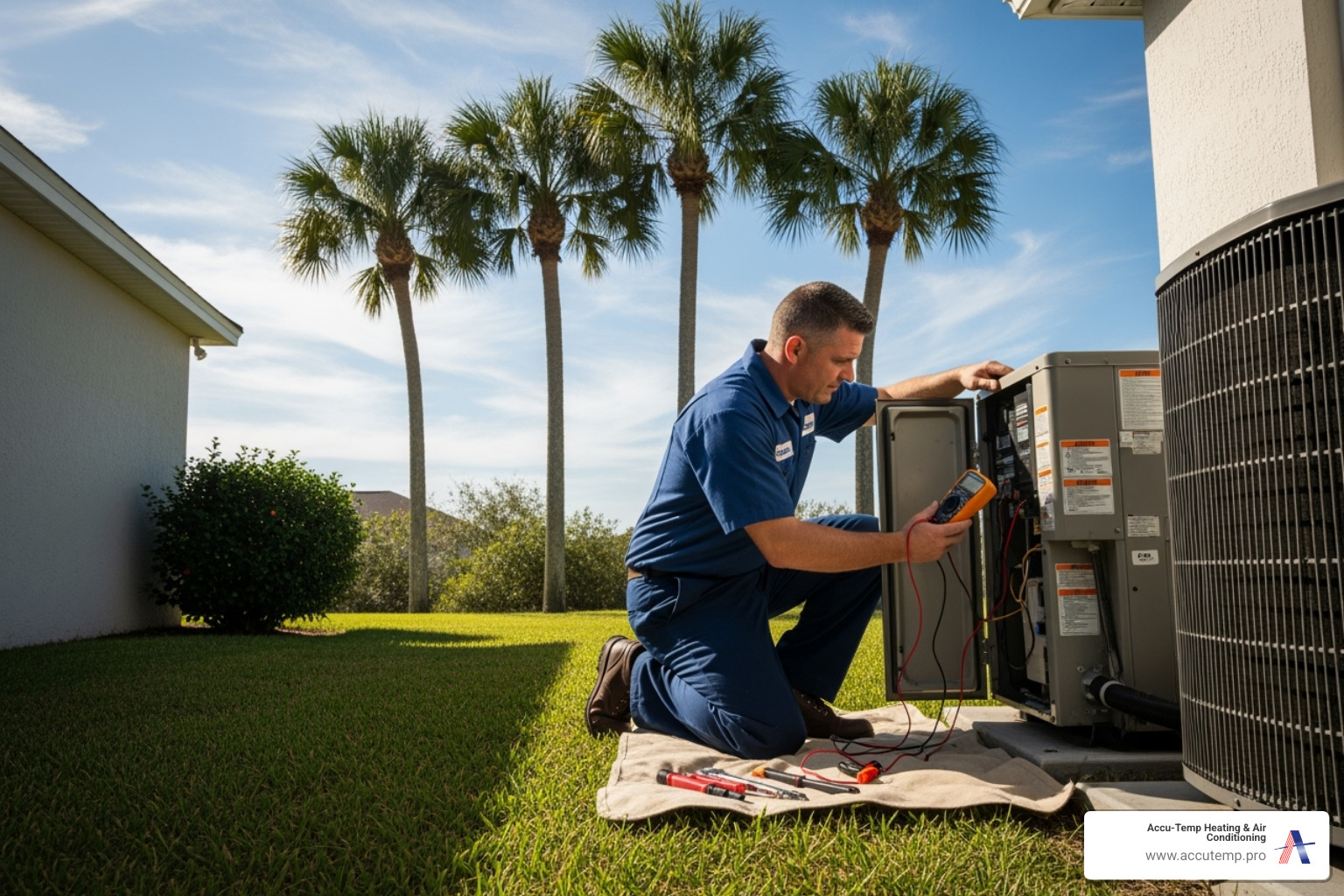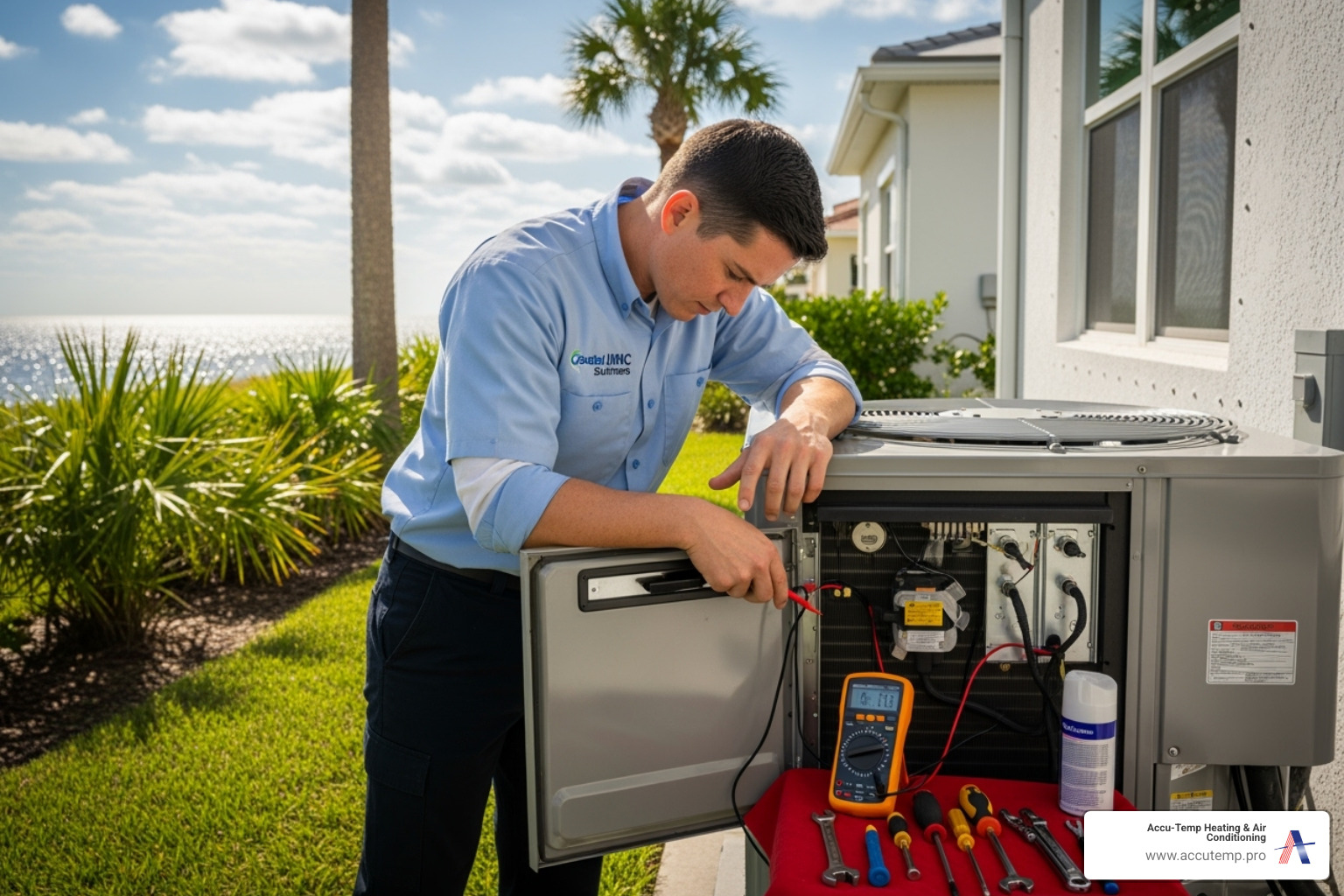Why Mini Split Maintenance Matters More Than You Think
Mini split maintenance is key to keeping your ductless system running efficiently, saving you money and helping you avoid costly breakdowns. Here’s a quick overview:
Essential Mini Split Maintenance Tasks:
- Monthly: Clean or replace air filters
- Every 6 months: Clean indoor and outdoor coils
- Annually: Professional tune-up and refrigerant check
- As needed: Clear condensate drain lines and remove outdoor debris
- Seasonally: Test heating/cooling modes and inspect for issues
Your mini split system works hard to provide comfort, especially in Florida’s coastal climate with its humidity and salt air. Regular maintenance delivers three major benefits: it keeps your system at peak efficiency (cutting energy use by up to 25%), extends its lifespan from 10 years to 15-20 years, and maintains excellent indoor air quality by preventing mold growth.
Neglecting maintenance is like driving a car without oil changes—you’ll eventually face expensive consequences. A simple monthly filter cleaning and annual professional service can prevent thousands in emergency repairs.
Why Regular Maintenance is a Smart Investment
Think of regular mini split maintenance as an insurance policy for your comfort and wallet. Proper care improves efficiency, lowers energy bills, extends your system’s lifespan, improves indoor air quality, and prevents costly emergency repairs. The link between efficiency and maintenance shows that well-maintained systems use less energy, saving you money.
In the Palm Coast to Daytona Beach area, the salt air and humidity put extra stress on mini splits. Regular maintenance identifies small issues before they become expensive problems, like a complete system breakdown in summer. More on the benefits of regular service highlights how preventive care makes a difference.
The Impact on Efficiency and Longevity
Proper maintenance can save you up to 15% on energy bills. When components are clean, the system doesn’t work overtime to keep you comfortable. A well-maintained mini split can last 15-20 years, compared to just 10 years for a neglected one.
Dirty filters and coils force your system to work harder, causing strain that wears down components faster. Regular maintenance prevents component wear and reduces strain on the system by ensuring optimal airflow and heat transfer. This allows your mini split to focus on keeping you comfortable. Learn more about how to optimize efficiency.
Enhancing Your Home’s Air Quality
Your mini split also cleans the air by trapping dust and allergens in its filter. When filters get dirty, they stop working effectively. In Florida’s humid climate, this also raises the risk of preventing mold growth. Clogged condensate lines can cause moisture to back up, creating a breeding ground for mold inside your unit.
This is especially important for allergies and respiratory health. A well-maintained system improves indoor air quality, while a neglected one can make it worse. Regular mini split maintenance ensures clean filters and proper drainage, providing fresher air for your family. Learn more about how maintenance improves air quality.
Your Essential DIY Mini Split Maintenance Checklist
Many essential mini split maintenance tasks are simple enough for a DIY approach.
Safety always comes first. Before starting, turn off the power at both the unit’s remote/thermostat and the circuit breaker. For most tasks, you only need basic items like a soft brush, a vacuum with a brush attachment, mild detergent, and a spray bottle.
How to Clean Your Mini Split Filters
Dirty filters reduce efficiency and increase wear on your system. Cleaning them is one of the easiest and most effective maintenance tasks.
- Power down the system completely at the unit and the breaker.
- Open the front panel on the indoor unit to access the filters. Consult your owner’s manual if you’re unsure how.
- Gently slide the filters out. Use a vacuum’s brush attachment for light dust. For heavier grime, rinse the filters under warm water with a drop of mild soap.
- Ensure filters are completely dry before reinstalling them. Damp filters can promote mold growth, a common issue in Florida’s humidity.
Clean your filters monthly during heavy use seasons (summer and winter). If you have pets or allergies, check them every few weeks. How to clean an HVAC filter offers more tips.
Cleaning the Indoor and Outdoor Coils
Clean coils are vital for the heat exchange process. The evaporator coils are inside your indoor unit, and the condenser coils are outside.
- Indoor Coils: With the power off, access the coils behind the filters. Use a soft brush or vacuum attachment to gently remove dust from the delicate metal fins. For a deeper clean, use a specialized no-rinse coil cleaner, following the product instructions.
- Outdoor Coils: After shutting off the power at the breaker, clear away any leaves, grass, or debris from around the unit, ensuring at least two feet of clearance. Gently rinse the coils with a garden hose (avoid high pressure, which can bend the fins), spraying from the inside out if possible. For stubborn grime, use a mild detergent solution and rinse thoroughly.
We recommend cleaning coils every six months. What happens with dirty coils explains the impact on system performance.
Clearing the Condensate Drain Line
In Florida’s humidity, your mini split removes a lot of moisture, which exits through the condensate drain line. A clog can cause water leaks inside your home.
- Locate the drain line, usually a PVC pipe leading outside from your indoor unit.
- Use a wet/dry vacuum to clear clogs. Secure the vacuum hose to the end of the drain line outside and run it for a few minutes to pull out any gunk.
- Flush the line with a 50/50 mixture of water and white vinegar to dissolve buildup and prevent algae growth.
- Test your work by pouring a cup of water into the drain pan or line opening. It should flow freely. If it doesn’t, you may need professional help.
Clearing the drain line prevents water damage and mold. Why your unit might be dripping water explains more about this common issue.
Professional Servicing: When to Call the Experts
While DIY mini split maintenance covers the basics, some tasks require professional expertise. In Florida’s demanding climate, we recommend professional servicing at least once a year (twice for heat pumps that run year-round) for a comprehensive system health check.
Tasks like refrigerant handling (which requires EPA certification), electrical diagnostics, and deep coil cleaning require specialized training and tools. While you can handle filter cleaning and debris removal, leave the more complex jobs to licensed technicians.
- DIY Tasks: Monthly filter cleaning, clearing debris from the outdoor unit, wiping surfaces, monitoring for issues.
- Professional Tasks: Deep coil cleaning, inspecting electrical components, checking refrigerant levels and for leaks, lubricating motors, calibrating controls, and comprehensive performance testing.
The importance of professional HVAC services is clear: catching a small issue early prevents a major breakdown later.
What a Professional Tune-Up Includes
When our technicians perform mini split maintenance, they go beyond basic cleaning. The service includes:
- Deep Cleaning: Using commercial-grade cleaners on indoor and outdoor coils, plus the blower wheel and fan assembly.
- Electrical Safety Inspection: Examining all connections for corrosion or loose wiring and checking critical components like run capacitors.
- Refrigerant System Evaluation: Precisely measuring refrigerant levels and inspecting lines for leaks, which can prevent compressor damage.
- Condensate System Check: Ensuring drain lines and pans are clear and any condensate pumps are working correctly.
- System Calibration: Verifying thermostat accuracy and running the system through heating and cooling cycles to test performance.
What to expect from a comprehensive service details our methodical approach.
Signs Your Mini Split Needs Professional Repair
Your mini split will often signal when it needs help. Call a professional if you notice:
- Strange Noises: Persistent gurgling (refrigerant issues), squealing (fan motor problems), or loud dripping (drainage problems).
- Poor Performance: The system can’t maintain the set temperature, even with clean filters.
- Unpleasant Odors: Musty smells may indicate mold, while burning odors can signal dangerous electrical problems.
- Water Leaks: Leaking from the indoor unit can point to a cracked drain pan or other issues beyond a simple clog.
- Ice on Coils: Ice on either the indoor or outdoor coils is a red flag for airflow or refrigerant problems. Turn the system off and call for service.
- High Energy Bills: A sudden spike in your bill means the system is working inefficiently and needs a professional diagnosis.
These signs your system needs maintenance are your system’s way of asking for help.
A Seasonal Guide to Mini Split Care
In Florida, mini split maintenance should adapt to our unique seasons, from relentless summer humidity to sudden cold snaps. A seasonal approach spreads out tasks and keeps you ahead of potential problems, ensuring your system is ready for the demands of our climate.
Following a helpful seasonal checklist can keep you on track.
Spring & Summer Preparation
Prepare your mini split before the sweltering summer arrives to prevent frustration later.
- Clean Filters: Start with a thorough filter cleaning after the milder winter months.
- Clear Outdoor Unit: Remove any leaves, dirt, or debris that has accumulated around the condenser unit. Ensure it has at least two feet of clearance for proper airflow.
- Test Cooling: Turn on the AC on a warm day to ensure it’s cooling properly. Listen for any unusual sounds.
- Schedule Professional Service: Spring is the ideal time for an annual professional tune-up to catch issues before they become summer emergencies.
These tips to get your AC ready for summer will help you beat the heat.
Fall & Winter Upkeep
As temperatures cool, transition your system from cooling to heating.
- Perform a Fall Cleaning: Clean the filters and coils after a long summer of use.
- Protect Outdoor Unit: Keep the area around your outdoor unit clear of falling leaves and storm debris.
- Test Heating Mode: Don’t wait for a cold snap. Switch your system to heat on a cool day to confirm it’s working correctly.
- Monitor for Issues: On rare freezing nights, watch for excessive ice buildup on the outdoor unit, which may require professional attention.
- Check Home Seals: Ensure windows and doors are sealed properly to help your system heat more efficiently.
Understanding why heating maintenance is critical can save you money, even in Florida.
Frequently Asked Questions about Mini Split Maintenance
Homeowners in the Palm Coast and Daytona Beach area often have questions about mini split maintenance. Here are answers to the most common ones.
How often should I clean my mini split filters?
Your filters are the first line of defense against dust and allergens.
- During heavy use (summer/winter): Clean filters monthly.
- During light use: Clean every 2-3 months.
- Special Conditions: If you have pets, allergies, or nearby construction, check filters every few weeks.
The best rule is to perform a visual inspection. If they look dirty, it’s time to clean them.
Is mini split maintenance expensive?
Mini split maintenance is an affordable investment in your home’s comfort.
- DIY Tasks: These are virtually free, requiring only basic household supplies.
- Professional Tune-Ups: While there is a cost, it’s minimal compared to emergency repairs. Think of it as an oil change for your HVAC system.
Regular maintenance prevents costly breakdowns, extends system life from 10 to 15-20 years, and lowers energy bills. It saves you money in the long run. See for yourself what is the cost of AC repair? that you’re avoiding with good maintenance.
What happens if I don’t maintain my mini split?
Ignoring maintenance leads to several problems:
- Higher Energy Bills: A dirty system works harder, consuming more electricity.
- Poor Air Quality: Clogged filters can’t trap pollutants and can even become a source for mold growth in our humid climate.
- Frequent Breakdowns: Overworked components wear out faster, leading to failures at the worst possible times.
- Shortened Lifespan: A neglected system may only last 10 years instead of the expected 15-20, forcing a premature and expensive replacement.
Skipping maintenance doesn’t save money; it costs more through higher bills, repairs, and early replacement.
Conclusion
The truth about mini split maintenance is simple: regular attention prevents stress and expense, ensuring your system works for you, not against you. This guide has shown that many tasks, like cleaning filters and coils, are simple DIY jobs that extend your system’s life and lower energy bills.
We’ve also highlighted when to call professionals for tasks like refrigerant checks and electrical inspections. Some things are worth doing yourself, and others are worth having done right. This balance of diligent home care and professional tune-ups is the key to a reliable mini split that can last 15-20 years, even in Florida’s demanding climate.
For homeowners in the Palm Coast to Daytona Beach area, Accu-Temp Heating & Air Conditioning is your trusted partner. As a family-owned business, we take your comfort seriously. Our 100% satisfaction guarantee means you can trust us to keep your system running at its best.
Whether you need DIY guidance or a professional tune-up, we’re here to help your mini split deliver peak performance for years. Learn more about our expert mini split heat pump services.


